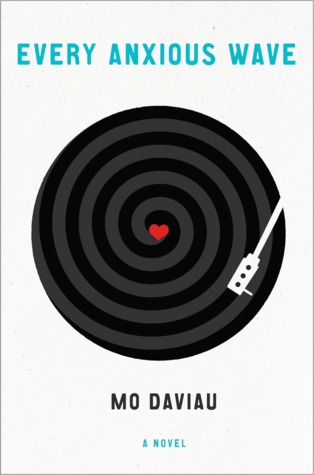 For my reading challenge this year, one of the categories was "The first book you see in a bookstore." Now, books are expensive these days and I wasn't going to shell out $20+ dollars for a book that I wasn't necessarily going to like. So I did the next best, and comparable, thing: I went to the DC library website and grabbed the first book that popped up there. That book happened to be Every Anxious Wave, which is about time travel.
For my reading challenge this year, one of the categories was "The first book you see in a bookstore." Now, books are expensive these days and I wasn't going to shell out $20+ dollars for a book that I wasn't necessarily going to like. So I did the next best, and comparable, thing: I went to the DC library website and grabbed the first book that popped up there. That book happened to be Every Anxious Wave, which is about time travel.Now, books about time travel and I don't get along, because there's just so much nonsense involved in them. Time travel is a very complicated subject to tackle in fiction because of the very notion of time paradoxes. Every Anxious Wave basically ignores these and just goes on its merry way, which really rubbed me the wrong way. I think there are some very interesting things here, and the characters were intriguing, but time and time again the mechanics of it kept getting in the way of me actually enjoying the story. Basically, I couldn't see the forest for the trees. The very idea of a guy finding a wormhole in his closet, and then using that to get rich/get a girlfriend (kind of) was pretty lame, but once Lena entered the picture and started fiddling around it got more interesting. I didn't actually think their relationship, or lack of thereof, was interesting, but what they were doing with time was...until they started to enter the whole "time paradox" territory, and then it put me off. Alternate-Lena was more interesting to me, and I think Glory was probably the coolest character of all; the very concept of a girl who spends her entire life time-hopping to "fix" her life because of the mucking about her parents did could have been a compelling story on its own, about how our actions impact others, which was a very minor part of Every Anxious Wave.
The book definitely got better as it went on; at the beginning, Karl was pretty much insufferable to me, going on and on about his bar and his failed rock band and such. Lena definitely made him a better person. Watching him trying to stick to his morals while everything crumbled around him provided some unusual fodder, but then the story kind of deteriorated into "guy gets girl, guy loses girl, guy time travels to try to get girl back." Honestly, I thought the chaos from their fiddling about should have been more pronounced if Daviau wanted to really hammer home the "appreciate what you have" aspects of the novel. Instead, the general feeling was that mucking about with time travel didn't actually have any real repercussions; a few things changed and a few people went missing, but overall everything was better. The parts of what people could and could not remember were strange, too; for example, Lena's sister gets "disappeared" and Lena no longer remembers her existence, but when a version of Lena herself disappears, someone other than the person responsible remembers her anyway. The ripple effect is extremely confined in this book, when it seems like, logically, it would be much more pronounced in a "real" time travel situation.
So, overall, this book was frustrating. I could see so many interesting components but never felt that they were truly put together or emphasized in the right way to make this an amazing story overall. The impact here could have been huge, but I think that it ultimately came home to just a "meh."
2 stars out of 5.
No comments:
Post a Comment